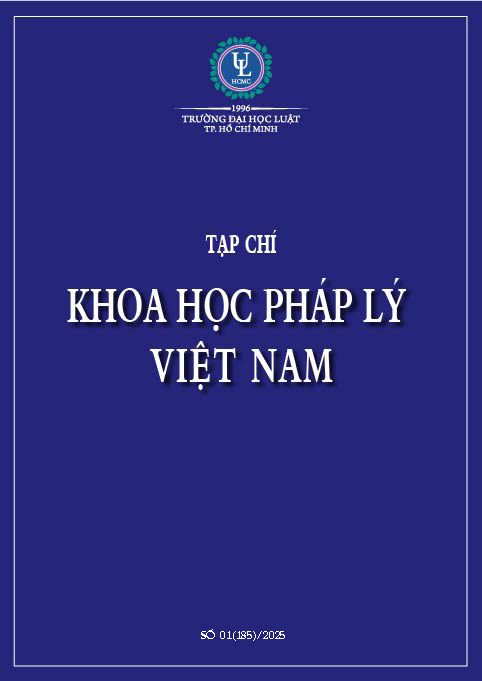Giới hạn quyền sở hữu theo pháp luật Nhật Bản và gợi mở cho pháp luật Việt Nam
DOI:
https://doi.org/10.70236/tckhplvn.205Từ khóa:
giới hạn quyền sở hữu, quyền sở hữu, lợi ích công cộng, Nhật BảnTóm tắt
Trên cơ sở nghiên cứu giới hạn quyền sở hữu trong pháp luật Nhật Bản, đặc biệt là vấn đề mục đích, nguyên tắc, phương thức giới hạn quyền, bài viết sẽ gợi mở một số vấn đề nhằm hoàn thiện pháp luật về giới hạn quyền sở hữu ở Việt Nam.
Tải xuống
Tài liệu tham khảo
[1] Christopher A. Ford, “Indigenization of Constitutionalism in the Japanese Experience”, The Case Western Reserve Journal of International Law, Vol. 28(1), 1996
[2] Akira Osuka and Takato Narisawa, “Major Legislation”, Waseda Bulletin of Comparative Law, Vol. 18, 1997
[3] Fritz Snyder, “Fundamental Human Rights Compared in Two Progressive Constitutions: Japan and Montana, Faculty Law Review Articles”, International Legal Perspectives, Vol. 1430, 2004
[4] Hayashi Tomoyoshi, “Roman Law Studies and the Civil Code in Japan: System, Ownership, and Co-Ownership”, Osaka University Law Review, Vol. 55, 2008, https://hdl.handle.net/11094/7747
[5] Đặng Minh Tuấn and Lê Quỳnh Mai, “Giới hạn quyền con người, quyền công dân tại Việt Nam: Nguyên tắc hiến pháp và vấn đề thực thi”, Khoa học Kiểm sát, số 5, 2020 [trans: Dang Minh Tuan and Le Quynh Mai, “Limitations on human rights and civil rights in Vietnam: Constitutional principles and implementation issues”, Procuracy Science, No. 5, 2020]
[6] Nguyễn Đăng Dung và những người khác, Tuyển tập hiến pháp của một số quốc gia, Nxb. Hồng Đức, Hà Nội, 2012
[7] Snyder Fritz, “Fundamental Human Rights Compared in Two Progressive Constitutions: Japan and Montana”, Faculty Law Review Articles, 2004
[8] Nobuhisa Ishizuka, “Constitutional Reform in Japan”, Columbia Journal of Asian Law, Vol. 33, 2019
[9] Narufumi Kadomatsu, “Functions of the Proportionality Principle in Japanese Administrative Law”, Academia Sinica Law Journal, Issue 22, 2018
[10] Junkichi Koshikawa, “Principles of Equity in the Japanese Civil Law”, The International Lawyer, Vol. 11(2), 1997
[11] John M. Maki, “The Constitution of Japan: Pacifism, Popular Sovereignty, and Fundamental Human Rights”, Law and Contemporary Problems, Vol. 53, 1990
[12] Shigenori Matsui, “Fundamental Human Rights and “Traditional Japanese Values”: Constitutional Amendment and Vision of the Japanese Society”, Asian Journal of Comparative Law, Vol. 13, 2018
[13] Ministry of Foreign Affairs of Japan, “General Comments”, Fourth Periodic Report by the Government of Japan under Article 40 Paragraph 1(b) of the International Covenant on Civil and Political Rights, Ministry of Foreign Affairs of Japan
[14] Mutsuo Nakamura, “Freedom of Economic Activities and the Right to Property”, Law and Contemporary Problems, 1990, Vol. 53
[15] Thomas Makoto Naruse, “Restrictions of Human Rights on the Basis of Public Welfare”, Japanese Society and Culure, Vol. 4, 2022
[16] Kawagishi Norikazu, “The Constitution of Japan: An Unfinished Revolution”, Yale Law School Dissertations, 2003, http://hdl.handle.net/20.500.13051/17632
[17] Kazuaki Sono and Yasuhiro Fujioka, “The Role of the Abuse of Right Doctrine in Japan”, Louisiana Law Review, Vol. 35, 1974
[18] Morris Suzuki, “The Ainu: Beyond the Politics of Cultural Coexistence”, Cultural Survival Quarterly Magazine, 2010
[19] Robert E. Ward and Sakamoto Yoshikazu (eds), Democratizing Japan, University of Hawai’i Press, 1987
[20] Po Jen Yap (ed.), Proportionality in Asia, Cambridge University Press 2020






